Ever Wondered Where Your Social Anxiety Really Started?
Over 15 million people have social anxiety — most don't know how, why, or when it began.
Click to Discover Your Anxiety's Roots!
Start Using The Anti-Anxiety Formula Right Now For Just $1?
OR
Social anxiety isn’t shyness — it’s fear that follows you everywhere. It’s replaying conversations in your head, convinced you said the wrong thing...
It’s that sinking feeling in your stomach when you have to speak in front of a group, or even making up excuses to leave early because the thought of small talk feels unbearable.
We know what it’s like to live with anxiety — the overthinking, the exhaustion, and the longing to feel normal again. You’re not alone, and things can get better.

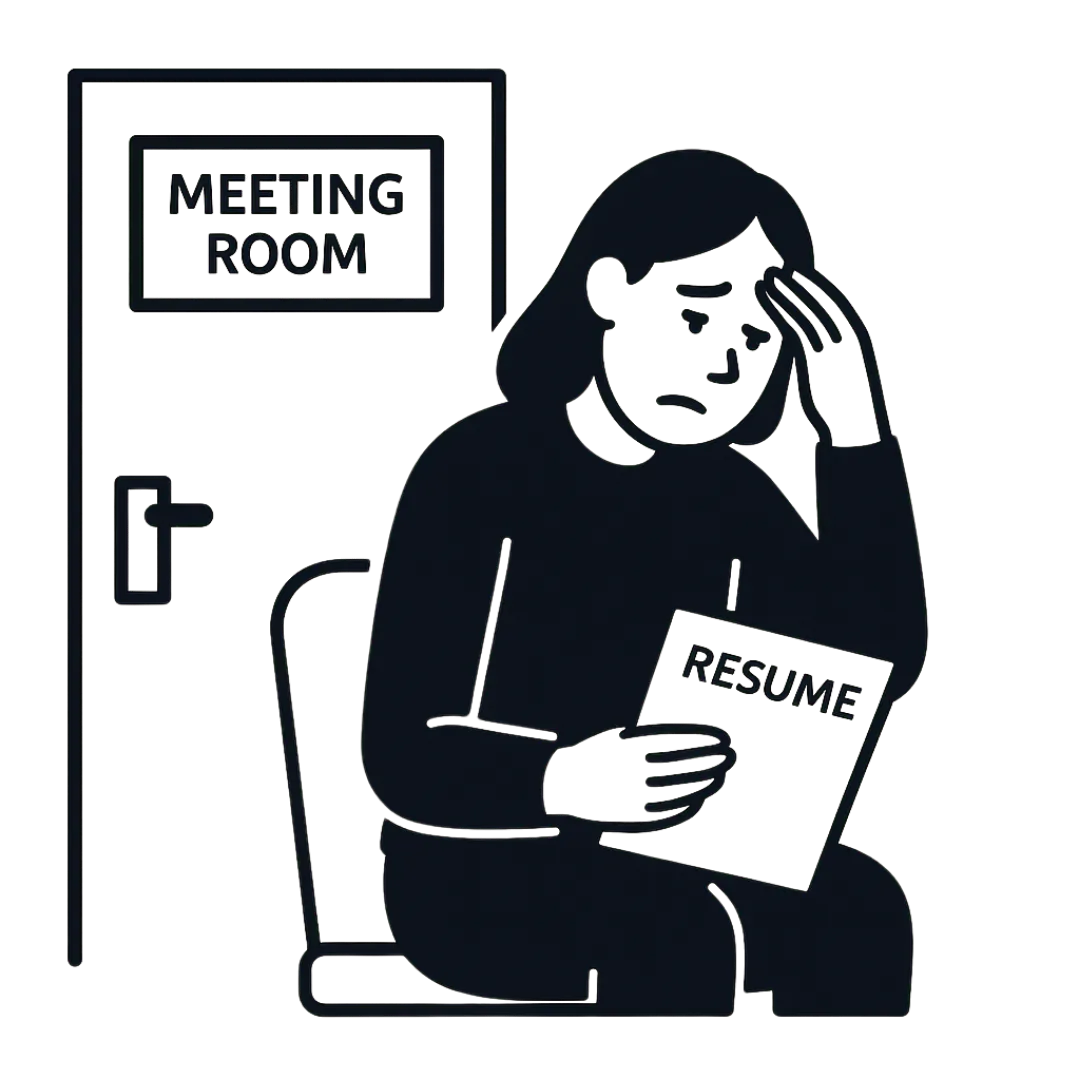
It holds you back from speaking up at work, making new friends, or even ordering your favorite coffee without panic.
Take Emily, for example. She spent weeks preparing for her dream job interview. Her resume was perfect, her answers rehearsed. But as the day got closer, the fear set in: “What if I say something stupid? What if I freeze?”
Emily canceled the interview, losing a chance to change her life.
This is the cost of social anxiety. It stops you from chasing opportunities, building relationships, and living the life you deserve. But it doesn’t have to be this way.
Have you ever wondered where your anxiety started?
For most people (75%), social anxiety quietly takes root in childhood. Maybe it started with teasing in middle school, or a teacher who made you feel small for speaking up. Now, even simple conversations feel like a battlefield.
For Liam, it was growing up with overprotective parents. Their constant worry about his safety made him second-guess every decision, leaving him feeling incapable of handling social situations on his own.
If this sounds like you, keep reading — there’s a proven way out.


One of the hardest truths about anxiety is how it can ripple into the next generation.
Take Anna, a mom whose social anxiety made her afraid to attend school events. Her child picked up on her avoidance, and soon he started feeling anxious around people too.
In Chapter 3 of “The Anxiety Handbook,” we explore how a parent’s anxiety can unintentionally affect their children - and, more importantly, how to stop the cycle.
By addressing your own anxiety, you’re not just helping yourself; you’re paving the way for a healthier future for your family.
Cognitive Behavioral Therapy (CBT) is a game-changer for people with social anxiety. It helps you break the cycle of fear by changing how you think, feel, and act.
Think of it this way: Your thoughts, emotions, and behaviors are all connected. CBT helps you challenge negative thoughts (like “I’ll embarrass myself”) and replace them with positive, realistic ones.
Over time, this rewires your brain to respond to social situations with confidence instead of fear.
What’s even better? CBT doesn’t take years to work. In just 8 to 12 weeks, you can start seeing real progress.

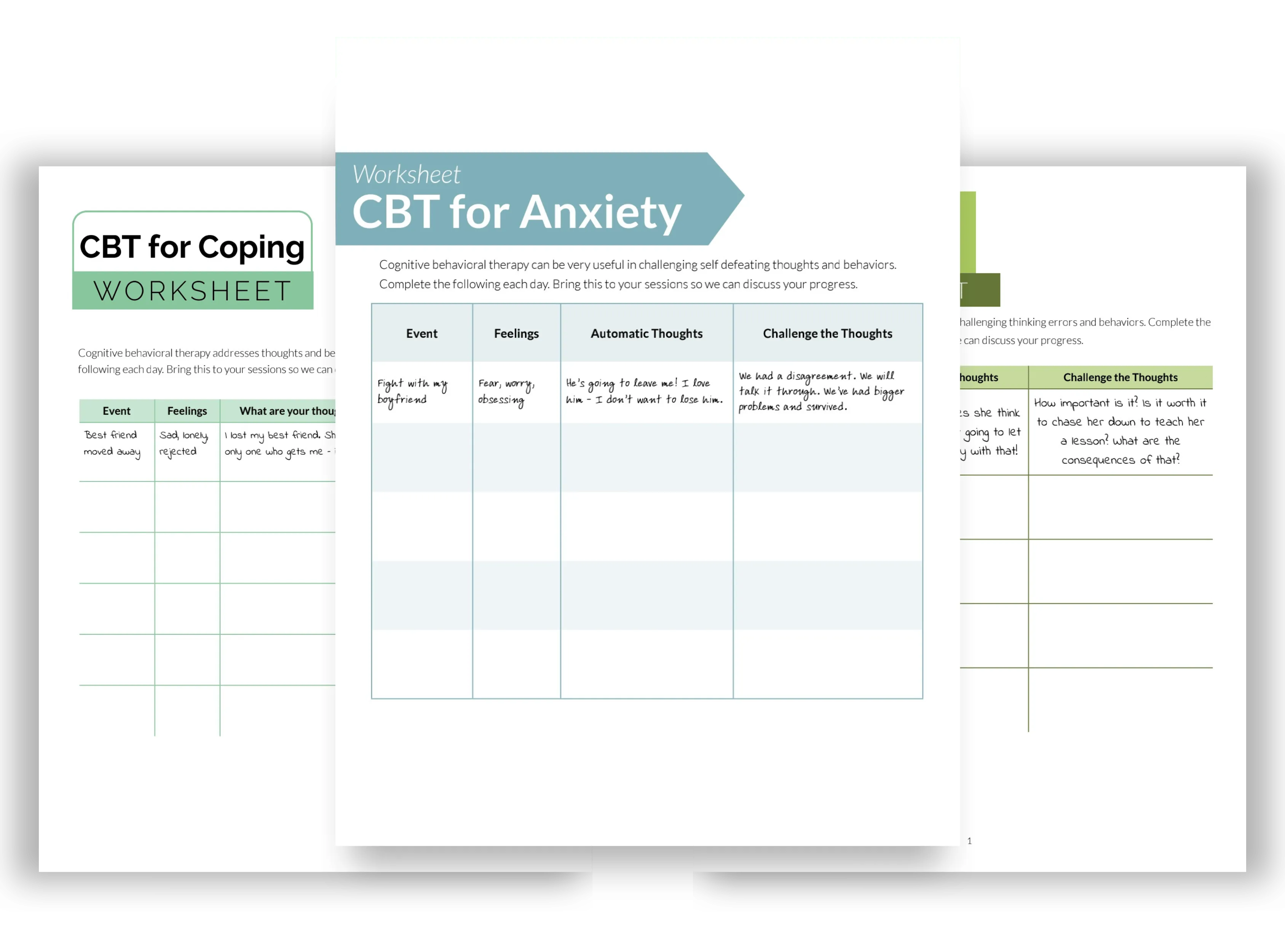
In this guide, we don’t just talk about CBT — we give you all the tools to make it work for you:
-
Worksheets to map out and challenge your negative thought patterns.
-
Real-world challenges that slowly help you build confidence — no pressure, no judgment.
-
Techniques to reframe worst-case scenarios and focus on realistic outcomes.
You don’t need to wait for a therapist to get started. With these resources, you can take control of your anxiety from the comfort of your home.
For some, medication can be a helpful addition to therapy, especially when anxiety feels too overwhelming.
Whether it’s anti-anxiety pills (SSRIs) to manage constant worry or beta-blockers for physical symptoms like sweating or nausea, we’ll help you understand the options so you can make the right choice for your needs.
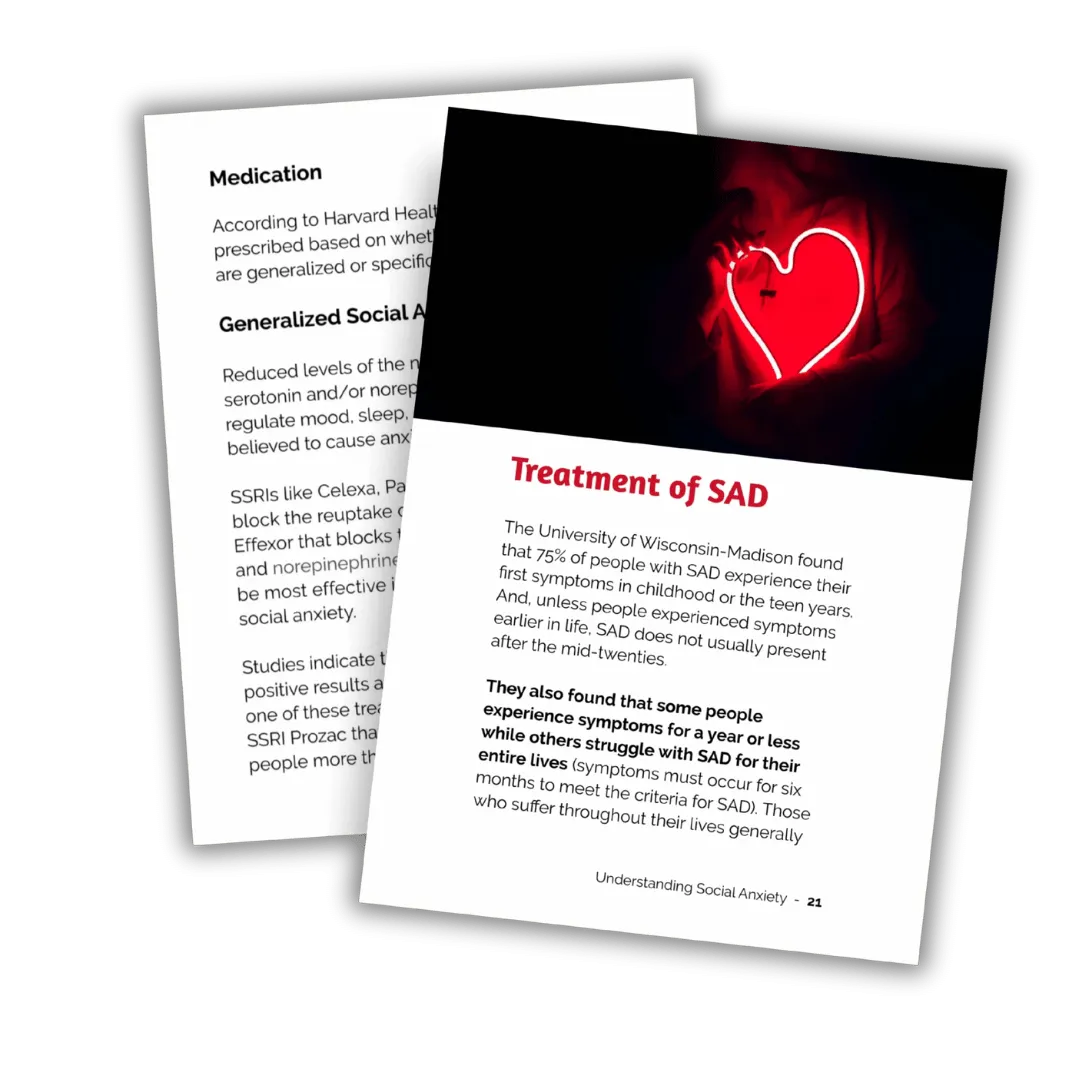

Imagine walking into a crowded room and feeling calm. No sweaty palms, no racing thoughts — just confidence.
For Sarah, this once felt impossible. But after using CBT techniques, she started small — practicing conversations with friends and gradually working up to larger social situations. Today, Sarah speaks up in meetings and even volunteers to lead presentations.
Confidence isn’t something you’re born with — it’s something you build. And with the right strategies, it’s completely within your reach.
If you have social anxiety, you’re already using this technique—just in a way that works against you. You focus entirely on the worst that could happen, convincing yourself it’s inevitable.
In Fight Your Fears, you'll understand that the worst case is the least likely to happen and that the best case should be your motivation to take action.
By imagining the most negative and positive outcomes, and comparing them with the most realistic and probable ones, you can reduce your anxiety when delivering a speech or meeting someone new.

Here's Everything You'll Find Inside...
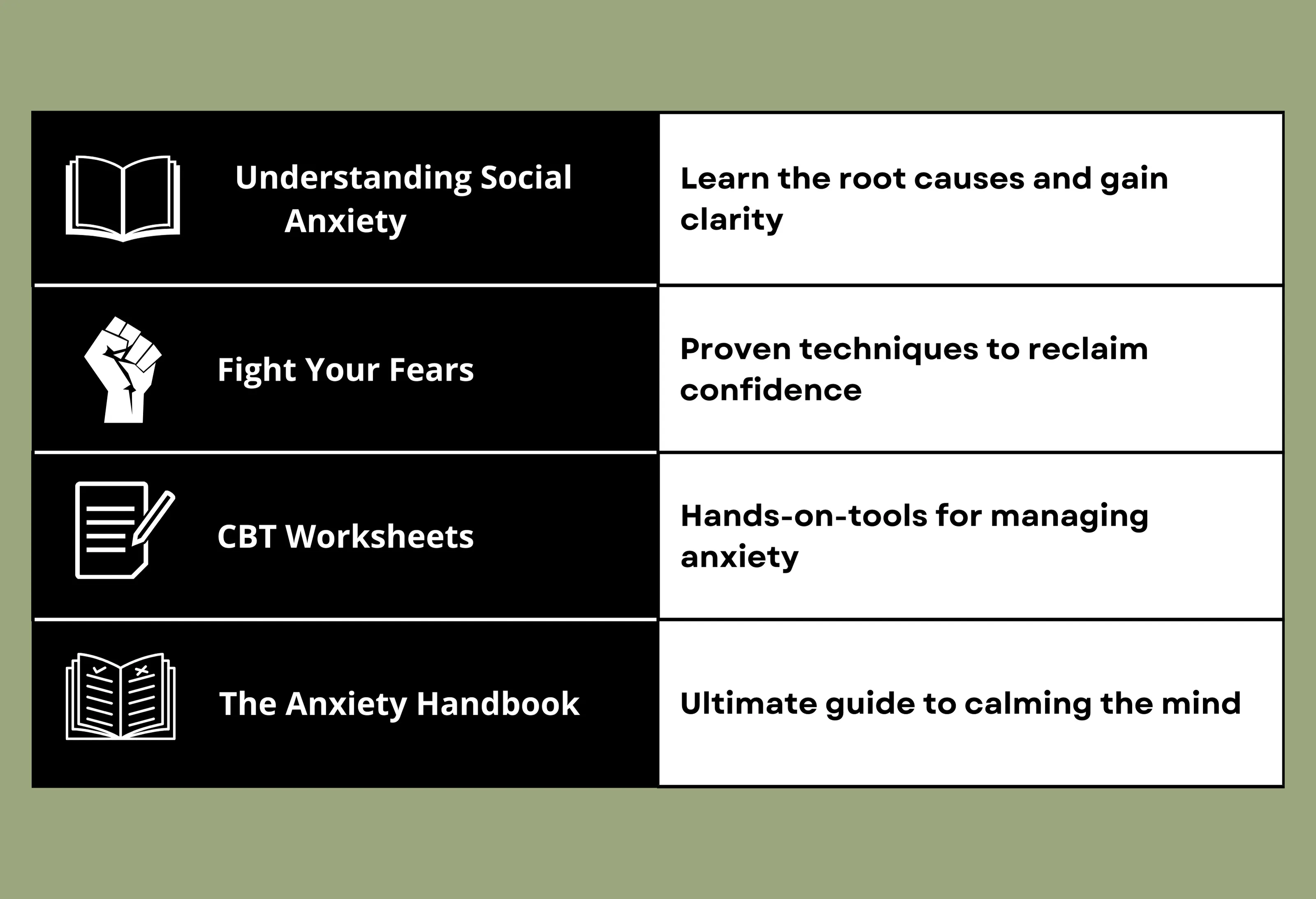
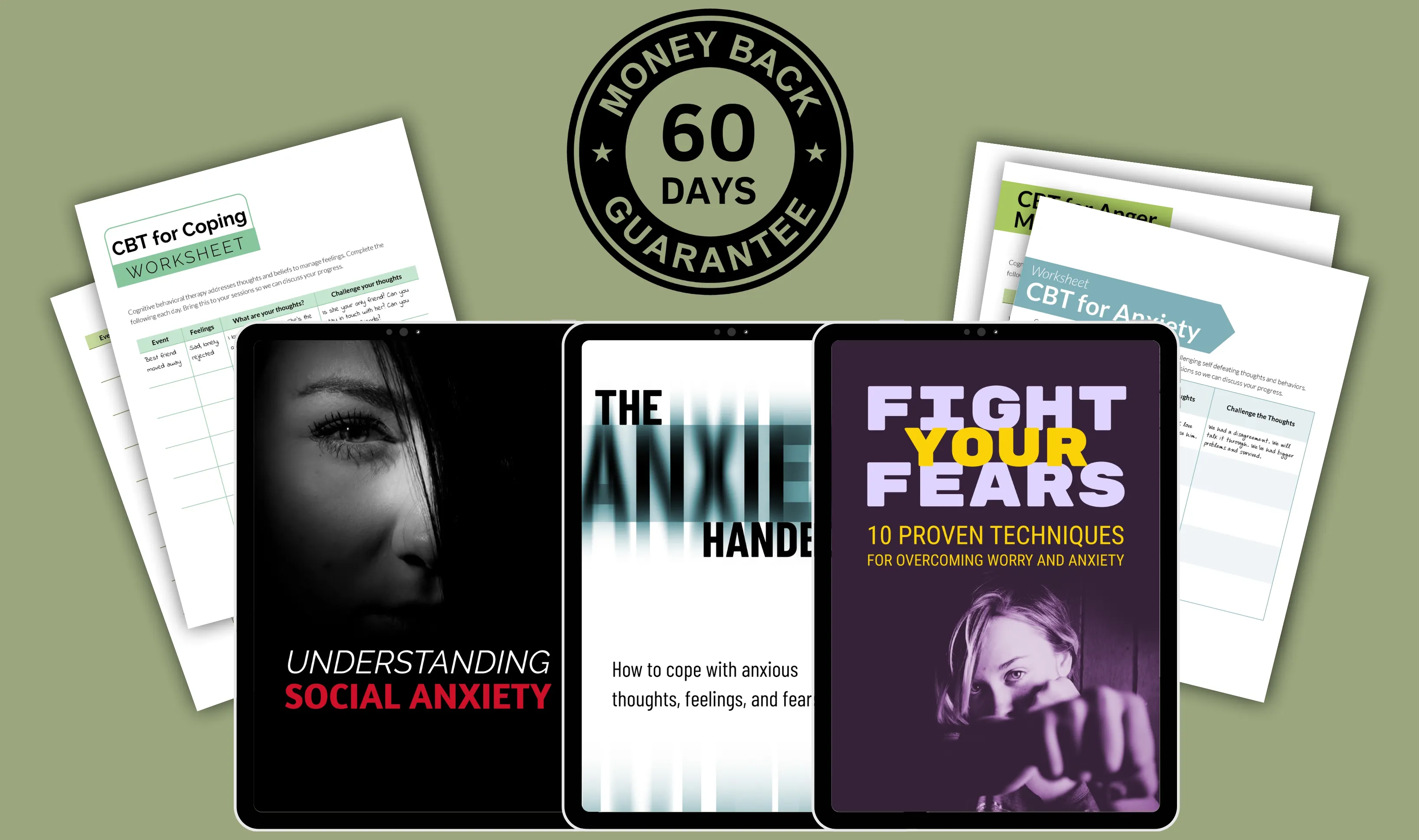
Invest in Yourself for Less Than a Single Therapy Session!
Your transactions are 100% secured. We use the best possible encryption method available.
"Finally something that works..."
"In my opinion, the only way to handle anxiety is to get in the situation you fear. Again and again. And with time, your anxiety gets weaker and weaker.
This kind of CBT helps you do that because exposure therapy (a type of CBT) is based on that idea."

Amy Bogaski
Jeffersonville, Kentucky
"Effortlessly making eye contact..."
"I used to have trouble maintaining eye contact and would often run through what I was going to say in my head as I was talking. It reached the point where I found it physically exhausting.
After applying their worksheet on communication, I find making conversation more comfortable."

Lisa Fenix
Atlanta, Georgia
"Exposure therapy changed me..."
"They teach you about a special kind of CBT called exposure therapy, this is what helped me.
I started putting myself in social situations, saying hi to strangers on the street, and speaking in front of groups more often. I got better at it. This is what worked for me. You can change."

Alessa Dolan
North Carolina

Our Commitment to Your Confidence
We understand that trying something new can feel uncertain, especially if you've been let down by self-help promises before. We’ve been there, too, and we know how frustrating it can be.
That’s why we’re offering a straightforward 60-DAY GUARANTEE. If you don’t feel our program delivers the results you’re looking for, simply let us know within the 60-day risk-free period, and we’ll provide a full refund.
No Hassle, No Questions Asked.
© 2025 Anxiety Prevention Centre (Rewire Brains) - Official Partner Of Psych Hub